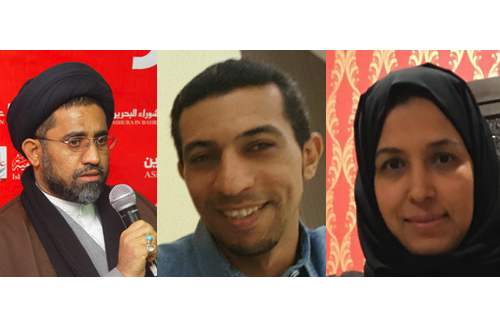The Bahrain Center for Human Rights (BCHR) expresses grave concern over the increasing number of activists convicted for exercising their freedom of speech on vague charges including “insulting the King of Bahrain”, “inciting hatred against the regime” and insulting other state institutions. BCHR strongly condemns the continuing restrictions of the right to freedom of expression in the Kingdom of Bahrain.
On 31 August 2016, Bahraini authorities sentenced three activists and social media users, who posted statements online or delivered speeches in which they allegedly insulted the King of Bahrain or the Kingdom’s authorities. One case concerns 33-year-old Taiba Ismaeel, who was sentenced to one year in prison and to a punitive fine of 1,000 Bahraini dinars for a number of tweets she had published on her personal Twitter account. The Bahraini authorities arrested her on 26 June 2016, without presenting a warrant for her arrest, and searched her apartment and confiscated her mobile phone. The public prosecution interrogated Ismaeel on the following day and charged her with allegedly “insulting the king and inciting hatred against the regime,” charges that have been used repeatedly by the authorities against Twitter users.
A second Twitter-related case concerns Hameed Khatam, who was arrested on 25 July 2016 from his house in Samaheej and charged with “insulting the king and inciting hatred against the regime” for comments he made on his personal Twitter account. Following a quick trial, the authorities sentenced Khatam to two years in prison. Both Khatam and Taiba were accused of using anonymous twitter accounts.
Another case concerns the cleric Majeed al-Mishal, who was sentenced to two years in prison. Al-Mishal, who is the head of the highest Shia religious institution in Bahrain, was arrested at the end of July 2016 and charged with leading the sit-in in Duraz and calling people to join the rally. The Duraz sit-in started in the wake of Sheikh Isa Qassim’s citizenship revocation and caused widespread protests in the country and in Qassim’s home town of Duraz in particular. In addition to the charges over instigating the Duraz protests, the Bahraini authorities charged Al-Mishal with inciting hatred against the regime.
The right to freely exercise one’s freedom of expression is often criminalized in Bahrain, including through the use of social media platforms such as Twitter. Since the beginning of 2016, BCHR has recorded ten sentences issued by either primary or appeal courts based on charges including “insulting the king”, “inciting hatred against the regime” or “insulting Ministry of Interior”. The sentences total 27 years and five months in prison, and fines of 12,100 Bahraini dinars (USD 32,100). In five of these ten cases, the charges were based on statements posted on Twitter, totaling ten years, five months in prison and fines totaling 12,100 Bahraini dinars.
Besides, eight others are currently on trial for similar charges, and at least five of them are currently detained. Among them is BCHR’s president and leading human rights defender Nabeel Rajab, who is facing charges including “insulting ministry of interior” in relation to tweets and retweets posted in 2015 about the war in Yemen and torture at Jaw prison. Rajab faces imprisonment of up to 15 years if convicted. However, his trial has been postponed three times and is now expected to take place on 6 October 2016.
A frequent target of the Bahraini government is activist Zainab Al-Khawaja, who has been imprisoned repeatedly over the last five years. Most recently, the authorities arrested Al-khawaja on 14 March 2016 to serve a sentence of 2 years and 4 months in prison and fined 3,000 Bahraini dinars (USD 7,900) for charges over tearing a photo of the king. Although she was released on 31 May 2016, on “humanitarian” grounds, her sentence has only been suspended and she was forced into exile in Denmark due to threats of indefinite detention.
Based on Article 214 of the 1976 Penal Code, “a punishment of imprisonment for a period of no less than one year and no more than seven years and a fine of no less than BD1,000 and no more than BD 10,000 will be inflicted upon any person who offends in public the Monarch of the Kingdom of Bahrain, the flag or the national emblem.” It is not specified within the language of the law what constitutes an offence, allowing space for the authorities to criminalize any form of criticism of the king.
BCHR is deeply alarmed about the growing practice of curtailing dissent and the rights to freedom of speech and of expression including on Internet platforms in particular. We condemn the increasingly pervasive tactic to diminish access to information and any critical commentary of the government by blocking media website platforms, interrupting access to the Internet, and attempting to prevent the exposure of any form of information that does not align with government rhetoric.
The Bahraini government’s actions are in direct violation of Article 19 of the International Covenant on Civil and Political Rights (ICCPR), which guarantees the right to freedom of expression on any platform. It states that “every individual has the right to freedom of expression. This right shall include freedom to seek, receive and impart information and ideas of all kinds, regardless of the frontiers, either orally, in writing or in print, in the form of art or through any other media of his choice.”
In view of the abovementioned, the Bahrain Center for Human Rights calls on the Bahraini government to:
- Immediately and unconditionally release all Internet users and activists arrested and imprisoned for merely exercising their rights to freedom of speech and expression;
- Abide by international human rights standards by upholding the right to freedom of expression without any restrictions;
- End the politically-based retaliation against activists as well as social media users who peacefully exercise their right to freedom of expression and allow them to freely exercise their rights to free speech.

